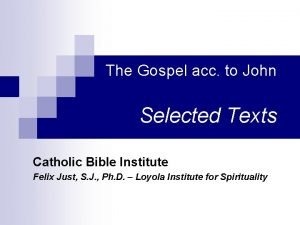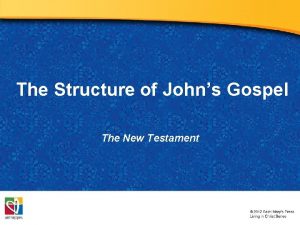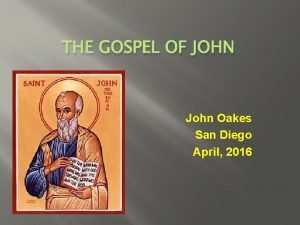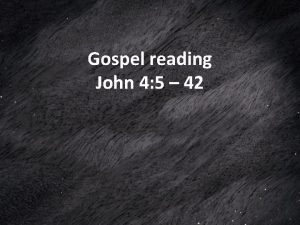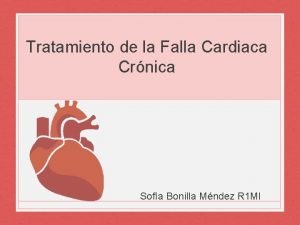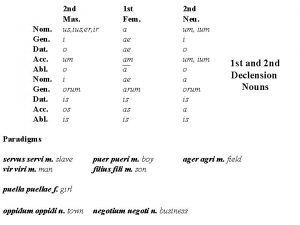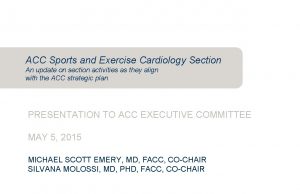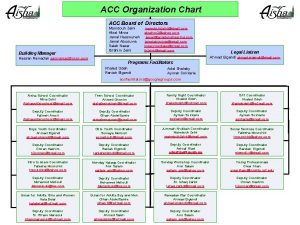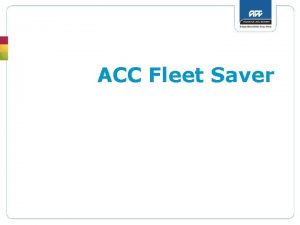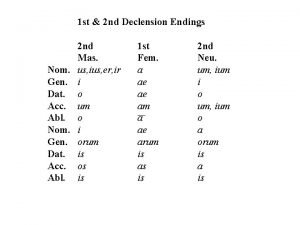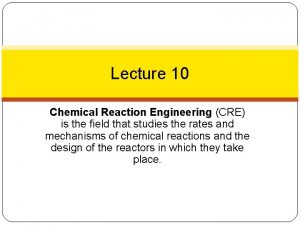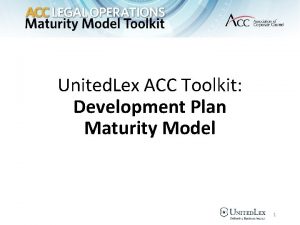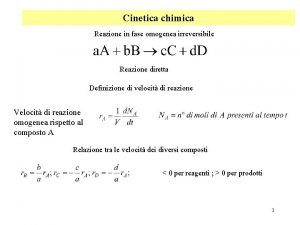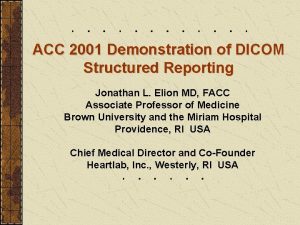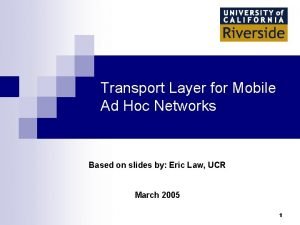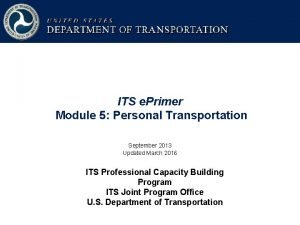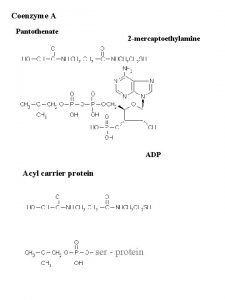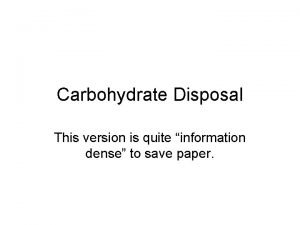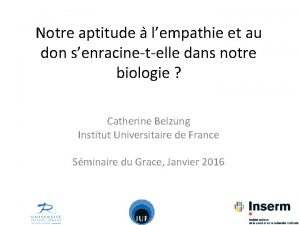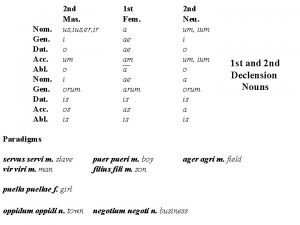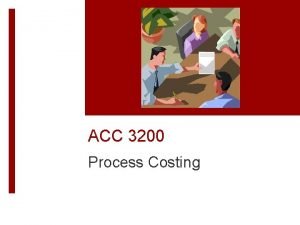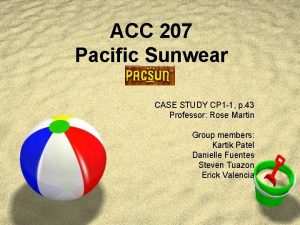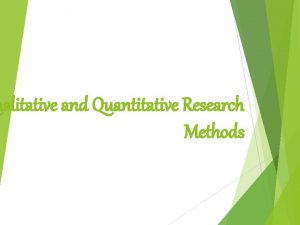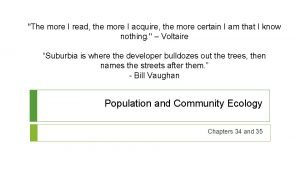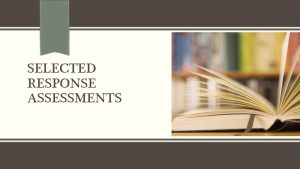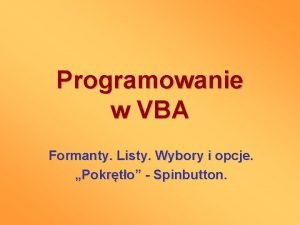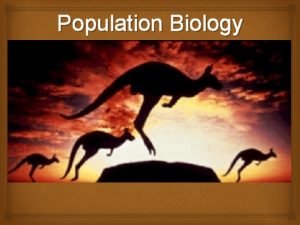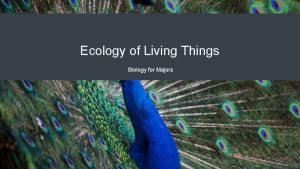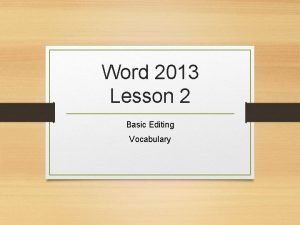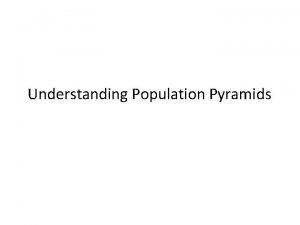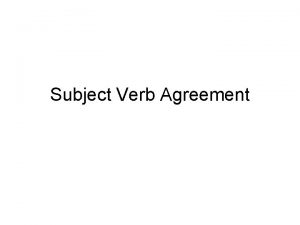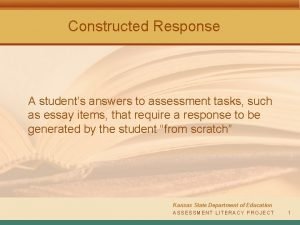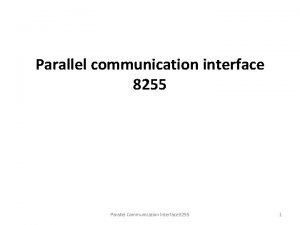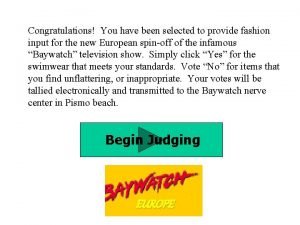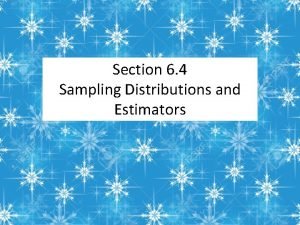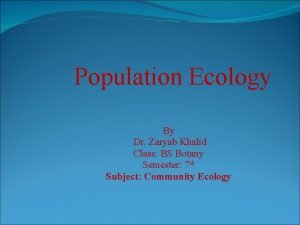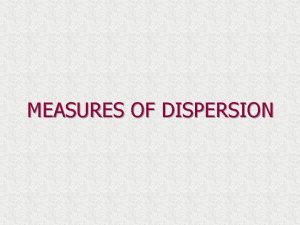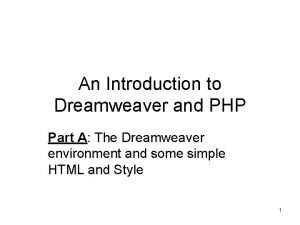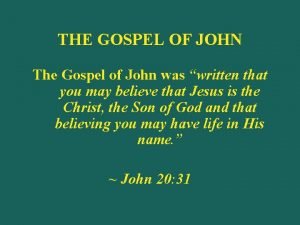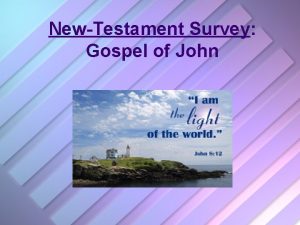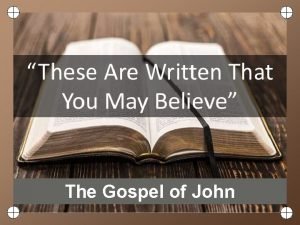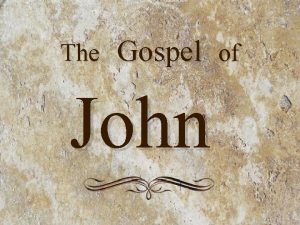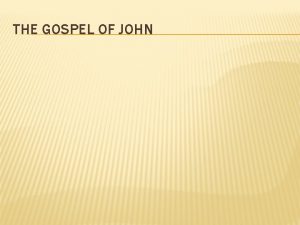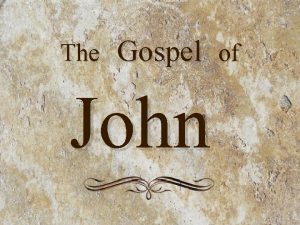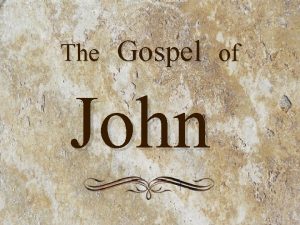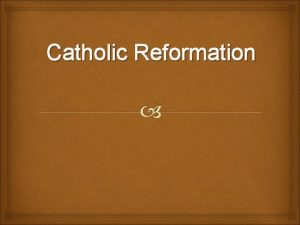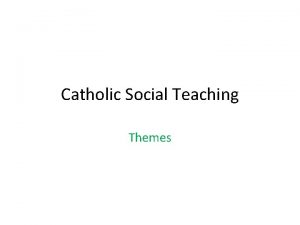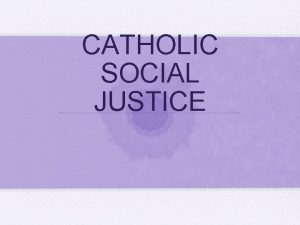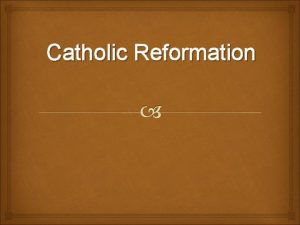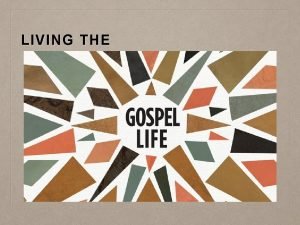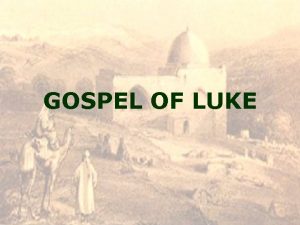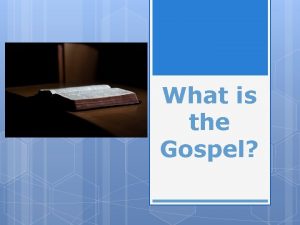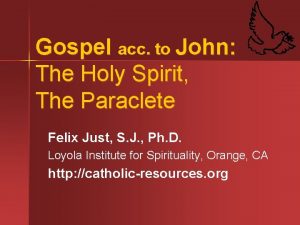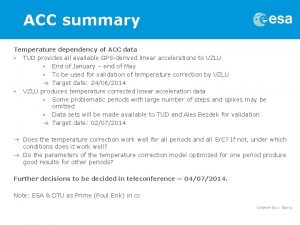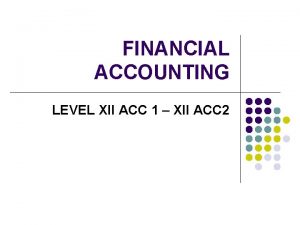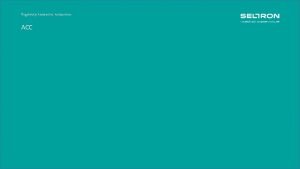The Gospel acc to John Selected Texts Catholic











![The Prologue – F, G, F’ F 11 He came into his own [things/realm], The Prologue – F, G, F’ F 11 He came into his own [things/realm],](https://slidetodoc.com/presentation_image/34e55629e5c80022515ab2f1cc70c5de/image-12.jpg)
![Rest of John 1 n Testimony of John [the Baptizer] (1: 19 - 34) Rest of John 1 n Testimony of John [the Baptizer] (1: 19 - 34)](https://slidetodoc.com/presentation_image/34e55629e5c80022515ab2f1cc70c5de/image-13.jpg)























































- Slides: 68

The Gospel acc. to John Selected Texts Catholic Bible Institute Felix Just, S. J. , Ph. D. – Loyola Institute for Spirituality

John’s Gospel in Music n That You May Have Life: Musical Stories from the Gospel of John ¨ Marty Haugen; GIA, 2005 ¨ Lyrics on Fr. Just’s Website: n http: //catholic-resources. org/Bible/Music- Haugen. htm n Copyright Restricted Access ¨ Username: “student” ¨ Password: “scripture”

Selected Texts John 1 n John 2 n John 6 n John 4 / 9 / 11 n John 13– 17 n John 18– 19 n John 20 n John 21 n C

Literary Structures n Chiasm ¨ Greek letter Chi (shaped “X”): look at left side only ¨ Ancient rhetorical style: helps in memorizing texts ¨ First & second halves balanced: in reverse order ¨ Highlight/Climax in the Middle: not like today, at end n n ABA; ABCDCBA; ABCDEDCBA; etc. Johannine Prologue (John 1: 1 -18) ¨ Most important verse in common opinion: v. 14? ¨ Central verse/theme in chiasitic analysis?

The Johannine Prologue (John 1: 1 -18) A) 1 -2: The Divine Word was with God eternally B) 3: All things came into being through him (the Word) C) 4 -5: In him was life and light, which darkness did not overcome D) 6 -8: [John was not the light, but came to testify about the light] E) 9 -10: The True Light was in the world, but the world did not recognize him F) 11: He came into his own realm, but his own people did not accept him G) 12: THOSE WHO DO BELIEVE IN HIM BECOME CHILDREN OF GOD F’) 13: These believers are not ordinary human offspring but are born of God E’) 14: The Incarnate Word reveals God’s glory, full of grace and truth D’) 15: [John testified about the priority of the one coming after

Johann Christoph Weigel, 1695 John 1: 14

The Prologue – A & A’ A 1 In origin was the Word, and the Word was toward [the] God, and god/deity/God was the Word. 2 This one was in origin toward [the] God. A' 18 No one has seen God ever. The only-begotten God [or Son], the one existing in the bosom/lap of the Father, that one has revealed [him].

The Prologue – B & B’ B 3 All things through him came into being, and without him came into being not one thing. B' 17 Because the law through Moses was given; the grace and the truth through Jesus Christ came into being.

The Prologue – C & C’ C What has come into being 4 in him was life, and the life was the light of humans; 5 and the light in the darkness shines, and the darkness did not overcome it. C‘ 16 Because out of his fullness we all received, even grace upon/from grace.

The Prologue – D & D’ D 6 There was human sent from God; his name was John. 7 He came in testimony, so that he might testify about the light, so that all might come to believe through him. 8 He was not the light, but […] so that he might testify about the light. D' 15 John is testifying to him and has cried out, saying, “This was the one of whom I said, The one coming after me came into being before me because he was prior to me.

The Prologue – E & E’ E 9 The true light, which enlightens every human, was coming into the world. 10 He was in the world, and the world through him came into being, and the world did not recognize him. E' 14 And the Word became flesh, and tented among us, and we have seen his glory, glory like an only-begotten [child] of the father, full of grace and of truth.
![The Prologue F G F F 11 He came into his own thingsrealm The Prologue – F, G, F’ F 11 He came into his own [things/realm],](https://slidetodoc.com/presentation_image/34e55629e5c80022515ab2f1cc70c5de/image-12.jpg)
The Prologue – F, G, F’ F 11 He came into his own [things/realm], and his own [people] did not accept him. G 12 But as many as did receive him, he gave to them authority to become children of God, to those who believe in his name, F' 13 those who, neither of bloods, nor of the will of the flesh, nor of the will of a man, but of God were born.
![Rest of John 1 n Testimony of John the Baptizer 1 19 34 Rest of John 1 n Testimony of John [the Baptizer] (1: 19 - 34)](https://slidetodoc.com/presentation_image/34e55629e5c80022515ab2f1cc70c5de/image-13.jpg)
Rest of John 1 n Testimony of John [the Baptizer] (1: 19 - 34) ¨ I) Prophetic Testimony of John about Himself (1: 19 -28) ¨ II) Prophetic Testimony of John about Jesus (1: 29 -34) n The First Disciples of Jesus (1: 35 -51) ¨ A 1) The First Two Disciples (1: 35 -39) ¨ A 2) The Third Disciple (1: 40 -42)

Call of the First Disciples in FG n Note the dynamics of who calls whom to discipleship: #1&2 - John (Baptist) sends two of his disciples to follow Jesus. #1&2 - One is named Andrew, but the other remains anonymous. #3 - Andrew brings his brother Simon (Peter) to Jesus. #4 - Jesus finds and invites Philip personally. #5 - Philip talks to Nathanael about Jesus. n Contrast: ¨ In Mark and Matthew, Jesus calls two pairs of

John 2 n First Sign: Wedding at Cana n Incident in the Jerusalem Temple n Transition to Ch. 3

John 6 n Feeding of 5000 ¨ Contrast DETAILS with Mark, Matthew, Luke n Walking on Water ¨ Not really a “SIGN” in FG; no one comes to believe n Bread of Life Discourse ¨ Part III ¨ Part IV

Lenten Scrutiny Gospels n 3 rd Sunday of Lent – WATER: ¨ The Samaritan Woman at the Well (John 4: 1 -42) n 4 th Sunday of Lent – LIGHT: ¨ The Man Born Blind (John 9: 1 -41) n 5 th Sunday of Lent – LIFE: ¨ Martha, Mary, and Lazarus (John 11: 1 -54)

The Samaritan Woman - DUCCIO di Buoninsegna

Gustave Doré

The Samaritan Woman (John 4: 1 -42) A) 1 -4: Transition: Departure from Judea toward Galilee B) 5 -6: Jesus arrives at Jacob’s well near Sychar in Samaria C) 7 -15: Dialogue: Jesus & Woman about Water & Thirst D) 16 -26: Dialogue: Jesus & Woman about Worship and the Messiah A') 27: Transition: Disciples return & wonder about the Woman B') 28 -30: Woman tells her villagers about the

The Man Born Blind – DUCCIO di Buoninsegna

Jerome Nadal

The Man Born Blind (John 9: 1 -41) A) 1 -5: Jesus & the disciples relation of sin & blindness B) 6 -7: Jesus & the blind person bringing the person to physical sight C 1) 8 -12: neighbors & ex-blind person question of person’s identity; process of healing D 1) 13 -17: ex-blind person & Pharisees discussion of Jesus’ origin: from God? sinful? C 2) 18 -23: parents & Jewish authorities question of person’s identity; process of healing D 2) 24 -34: ex-blind person & authorities discussion of Jesus’ origin: from God? sinful? B') 35 -38: Jesus & ex-blind person bringing the person to full spiritual insight A') 39 -41: Jesus & the Pharisees relation of sin & blindness

The Raising of Lazarus – DUCCIO di Buoninsegna

Gustave DORÉ

Mary, Martha, Lazarus (John 11: 1 -54) A) 1 -6: Introduction: Jesus receives a message from Martha and Mary about Lazarus’ illness B) 7 -16: Jesus and his disciples talk about Lazarus and the meaning of death C) 17 -27: Jesus and Martha talk about resurrection and eternal life C') 28 -37: Jesus and Mary express both deep sorrow and great love B') 38 -44: Jesus calls Lazarus out of the tomb, raising him from the dead A') 45 -54: Conclusion: Reactions of people who saw or heard about the raising of Lazarus

Group Exercise (before the break, please!) n Choose ONE of the three Scrutiny Gospels ¨ John 4 – Samaritan Woman at the Well ¨ John 9 – Man Blind since Birth ¨ John 11 – Martha, Mary, and Lazarus n Discuss in your groups: ¨ What major Johannine theme is stressed here? ¨ What does this story say about Jesus’ identity? ¨ How do the characters grow in believing? ¨ What does this story say for believers today?

Afternoon Break

Last Supper (John 13– 17) n Chiastic Structure: ¨ The Washing of the Feet (13: 1 -30) n The Last Supper Discourse (13: 31– 16: 33) ¨ The Prayer of Jesus (17: 1 -26) n Historical Expansion: ¨ Original ending 14: 31 – “Get up, let us go. ” (NAB) ¨ Continued 18: 1 – “When he had said this, Jesus went out…” ¨ Chaps. 15– 17 added later ?

The Last Supper Discourse Chiastic Structure: A) 13: 31 -38 - Introduction: Jesus gives new Love Commandment; foretells Peter's denials B) 14: 1 -7 - Don't let your hearts be troubled; I Am the Way, the Truth, and the Life C) 14: 8 -14 - Seeing and Believing in Jesus and in the Father; Mutual Indwelling D) 14: 15 -24 - The Paraclete, Spirit of Truth; Keep the Commands/Words of Jesus E) 14: 25 -31 - The Paraclete, whom the Father sends in my name; I Love the Father F) 15: 1 -10 - The Vine and the Branches; Remain in Me, as I Remain in You G) 15: 11 – Purpose/Goal: My JOY in You; Your JOY Complete F') 15: 12 -17 - My Commandment: Love One Another as I Have

Gospel acc. to John: The Holy Spirit, The Paraclete Felix Just, S. J. , Ph. D. Loyola Institute for Spirituality, Orange, CA http: //catholic-resources. org

What is "spirit" / "Spirit"? 32

"Spirit" in the Bible n Heb. Ruach & Gk. Pneuma refer to various things – Root meaning: "moving air" = wind, breath, spirit – Could be something natural, human, evil, or divine n Hebrew Bible: Ruach – Translation of Gen 1: 1 -2? – "In the beginning when God created the heavens and the earth, the earth was a 33

Jacques Tissot - Creation 34

"Spirit" in the Hebrew Bible n God’s Ruach as the basis of life – "Then the LORD God formed man (Adam) from the dust of the ground, and breathed into his nostrils the breath of life; and the man became a living being. " (Gen 2: 7) – "Then he said to me, ‘Prophesy to the breath, prophesy, mortal, and say to the breath: Thus says the Lord GOD: Come from the four winds, O breath, and breathe upon these slain, that they may 35

Ezekiel 37 Georg Weigel 36

"Spirit" in the Hebrew Bible n God’s Ruach with prophets, judges, kings – "Then the LORD came down in the cloud and spoke to him (Moses), and took some of the spirit that was on him and put it on the seventy elders; and when the spirit rested upon them, they prophesied. But they did not do so again. " (Num 11: 25) n Note: "Prophecy" is not "predicting the future" 37

"Spirit" in the Hebrew Bible n God’s Ruach on the Messiah: – “A shoot shall come out from the stump of Jesse, and a branch shall grow out of his roots. – The spirit of the LORD shall rest on him, – the spirit of wisdom and understanding, – the spirit of counsel and might, – the spirit of knowledge and the fear of the LORD” 38

"Spirit" in the Bible n Greek Bible used by Early Christians: – Old Testament (LXX) & New Testament n PNEUMA = any "moving air": wind, breath, spirit – Cf. English "pneumonia" = illness of the lungs – or "pneumatic" (air-powered) tools: drills, pumps… n Greek verbs pneo / ekpneo = "to breathe 39

"Pneuma" in the NT n n Something in nature: moving air, wind, breath Something human, but from God: spirit of adoption, spirit of faith, spirit of gentleness, spirit of glory, spirit of grace, spirit of holiness, spirit of life, spirit of power & love & selfdiscipline, spirit of prophecy, spirit of wisdom and revelation, spirit of your 40

"Pneuma" in the NT (cont. ) n Something demonic: – evil spirit, unclean spirit – demonic spirit, foul spirit – spirit of an unclean demon – spirit of cowardice, spirit of divination – spirit of error, spirit of slavery – spirit of the antichrist – spirit of the world, sluggish spirit 41

"Pneuma" in the NT (cont. ) n Something divine: – Holy Spirit, Holy Spirit of God – Spirit of (our) God, Spirit of the Living God, – Spirit of the Lord, Spirit of your Father, – Spirit of Him who raised Jesus from the dead, – Spirit of His Son, Spirit of Jesus – Spirit of Christ, Spirit of Jesus Christ – Spirit that is from God – Spirit of Truth, eternal Spirit – seven spirits of God (only in Rev 3) 42

Trinity from Mission Santa Clara & by El Greco 43

Holy Spirit? Icon by Andrei Rublev 44

Trinity from Mission Santa Clara 45

"Holy Spirit" in the Gospels (see statistics table on handout) n Mark: – "spirit" used 24 times, but "Holy Spirit" only 4 times n Matthew: – "spirit" used 19 x, but "Holy Spirit" only 5 x n Luke + Acts: – "spirit" used 36 x + 70 x; "Holy Spirit" used 13 x + 41 x – "Holy Spirit" drives all the action (see handout) 46

"Holy Spirit" in the Gospels 47

“Spirit” in JOHN’s Gospel n Meanings of pneuma: – “wind” (John 3: 8) – animating force of human life (3: 6) – Jesus’ own life force (11: 33; 13: 21; 19: 30) – something Jesus gives the disciples (20: 22) – something coming from God (1: 32 -33; 3: 5 -8; 15: 26) n “Holy Spirit” rare in John (only 3 x; cf. Luke/Acts) 48

“HOLY SPIRIT” in John n “Holy Spirit” present 3 x in Fourth Gospel: – near beginning (Jesus’ baptism; 1: 32 -33) – middle (Last Supper discourse; 14: 26) – end (first appearance of risen Jesus; 20: 22) n Curious that “Spirit” not mentioned in Prologue – Yet “Logos” in John 1: 1 -5 has much the same role as the “Spirit” in the creation 49

“PARACLETE” in John n Greek parakaleo (“to call to one’s side”) – Verb occurs often in NT, esp. Paul’s letters n Related noun parakletos only in John and 1 John – Translations? Counselor, Comforter, Advocate, etc. n Outside NT: parakaleo and parakletos used mostly in juridical/courtroom contexts 50

“PARACLETE” in John 51

Roles of the “PARACLETE” n Companion – will be with disciples “forever” after Jesus is gone (14: 16 -18; cf. 1 John 3: 24; 4: 13) n n Teacher – will “remind” disciples about Jesus’ own words & teachings (14: 26) Legal witness – will give “testimony” about Jesus to the disciples & world (15: 26) Judge – will “convict” (or “convince”? ) the world “about sin & righteousness & judgment” (16: 8 -11) Revealer – will “guide” disciples to “truth” 52

Texts with “PARACLETE” 14: 14 -17 – “If in my name you ask me for anything, I will do it. / If you love me, you will keep my commandments. / And I will ask the Father, and he will give you another ADVOCATE, to be with you forever. / This is the Spirit of truth, whom the world cannot receive, because it neither sees him nor knows him. You know him, because he abides with you, and he will be in you. ” 14: 25 -26 – “I have said these things to you while I am still with you. / But the ADVOCATE, the 53

Texts with “PARACLETE” 15: 26 -27 – “When the ADVOCATE comes, whom I will send to you from the Father, the Spirit of truth who comes from the Father, he will testify on my behalf. / You also are to testify because you have been with me from the beginning. ” 16: 7 – “Nevertheless I tell you the truth: it is to your advantage that I go away, for if I do not go away, the ADVOCATE will not come to you; but if I go, I will send him to you. ” 54

Questions for Reflection n Is Paraclete sent by the Father (John 14: 16; 14: 26) or by Jesus himself (15: 26; 16: 7)? n Why can’t the world “receive” the Spirit/ Paraclete (14: 17)? n Why can’t the Spirit/ Paraclete be sent until after Jesus’ departure (16: 7)? n What’s the relationship between Holy Spirit and forgiveness of sins (20: 21 -23)? 55

East Trinity vs. West Trinity Father (Creator) Son (Savior) Spirit (Life-giver) Father Son (Creator) (Savior) Spirit (Life-giver) 56

East vs. West 57

Great Prayer of Jesus (John 17: 1 -26) A) 1 -3: Jesus’ hour of glory has come; he gives eternal life and knowledge to believers B) 4 -8: Jesus’ work glorifying & revealing the Father is complete C) 9 -12: Jesus prays that God protect the believers who are still in the world D) 13: Jesus’ return to the Father will make the JOY of all who believe complete C') 14 -19: Jesus prays that God sanctify the believers who are not of the world B') 20 -23: Jesus’ unity with Father completes unity of all believers

John 17 in Art?

Jesus’ Prayer: John 17 (A. . D. . A’) A 1 After Jesus had spoken these words, he looked up to heaven and said, “Father, the hour has come; glorify your Son so that the Son may glorify you, 2 since you have given him authority over all people, to give eternal life to all whom you have given him. And this is eternal life, that they may know you, the only true God, and Jesus Christ whom you have sent. D 13 But now I am coming to you, and I speak these things in the world So that they may have my JOY made complete in themselves. A’ 24 Father, I desire that those also, whom you have given me, may be with me where I am, to see my glory, which you have given me because you loved me before the foundation of the world. 25 Righteous Father, the world does not know you, but I

Art Sources n Biblical Art on the WWW: ¨ http: //www. biblical-art. com/ n n by Rolf E. Stærk Biblical and Religious Art & Music: ¨ http: //catholic-resources. org/Art/ n by Felix Just, S. J.

John 18– 19: Passion (? ) n Passion Narrative Begins (18: 1 -27) ¨ Arrest ¨ Interrogation n Jesus' Trial before Pilate (18: 28 -40; 19: 1 -16 a) ¨ seven scenes, alternating outside & inside the praetorium n Crucifixion, Death, and Burial (19: 16 b-42)

Passion Narrative Begins (18: 1 -27) n The Arrest of Jesus: ¨ Introduction: Garden Scene (vv. 1 -2) ¨ Overcoming the Enemies (vv. 3 -6) ¨ Protecting the Disciples (vv. 7 -9) ¨ Conclusion: Peter's Sword vs. the Father's Cup (vv. 10 -11) n The Interrogation of Jesus: ¨ Introduction: High Priests Annas & Caiaphas (vv. 12 -14) ¨ Peter's First Denial (vv. 15 -18) ¨ Annas' Questions & Jesus' Responses (vv. 19 -24)

Jesus’ Trial before Pilate (18: 28– n 19: 16 a) Seven scenes, alternating outside/inside the praetorium: ¨ ¨ ¨ ¨ 18: 28 -32 (outside) Jewish authorities take Jesus to Pilate, who asks, “What accusation do you bring against this man? ” 18: 33 -38 a (inside) Pilate questions Jesus: “Are you the King of the Jews? ” Jesus: “My kingdom is not from this world. ” 18: 38 b-40 (outside) Pilate tells the Jews, “I find no case against him, ” and offers to release Jesus. 19: 1 -3 (implicitly inside) Pilate has Jesus flogged; soldiers mock him, saying, “Hail, King of the Jews!” 19: 4 -7 (outside) Pilate presents Jesus: “Here is the man!” Chief priests: “Crucify him!” 19: 8 -12 (inside) Pilate questions Jesus again, “Where are you from? ” Pilate again wants to release Jesus. 19: 13 -16 (outside) Pilate: “Here is your King!” Jews: “We

Crucifixion & Death of Jesus (19: 16 b-42) n Crucifixion scene overall: Jesus crucified between two others at Golgotha, the Place of the Skull (vv. 16 b-18) ¨ ¨ ¨ The Inscription with the political charge in three languages: "Jesus of Nazareth, the King of the Jews" (vv. 19 -22) The Soldiers divide Jesus' garments and casts lots for his tunic: scripture is fulfilled (vv. 23 -25 a; cf. Ps 22: 19) The Mother of Jesus and the Beloved Disciple: "Behold, your mother. Behold, your son" (vv. 25 b-27) The Thirst of Jesus; he drinks, thus "finishing" all his work and giving up his spirit (vv. 28 -30; cf. Ps 22: 16; 69: 22) The Legs of Jesus are not broken, but his side is pierced instead,

Burial of Jesus (19: 38 -42) n Joseph of Arimathea and Nicodemus: ¨ Ask Pilate for permission ¨ Remove and anoint the body of Jesus ¨ Bury it in a new garden tomb n Contrast details with Mark, Matthew, and Luke?

John 20: Resurrection Appearances n Empty Tomb Narrative (vv. 1 -10) n Risen Jesus Appears to Mary Magdalene on Sunday Morning (vv. 11 -18) n Risen Jesus Appears to His Disciples that Sunday Evening (vv. 19 -23) n Risen Jesus Appears to His Disciples again a Week Later (vv. 24 -29) n Gospel's First Conclusion (vv. 30 -31)

Epilogue (John 21: 1 -25) n Another Resurrection Appearance (21: 1 -14) ¨ Fishing Story, in Galilee (compare Luke 5? ) n Jesus Asks Peter about his Love (21: 15 -19) ¨ Three sets: Question, Responses, Commission ¨ Two different verbs: Agapein vs. Philein? n Peter and the Beloved Disciple (21: 20 -23) ¨ He “remains”; You “follow me”; False Rumors? n Second Conclusion to the Gospel (21: 24 -25) ¨ Not enough books ! ? !
 Jesus and the samaritan woman john 4 4-26
Jesus and the samaritan woman john 4 4-26 John 7:20
John 7:20 Structure of john's gospel
Structure of john's gospel Miracles in gospel of john
Miracles in gospel of john John 4:5-42
John 4:5-42 Nyha escala
Nyha escala Nom acc dat gen
Nom acc dat gen Management accounting means
Management accounting means Acc sports cardiology
Acc sports cardiology Jamal abusuwa
Jamal abusuwa Acc fleet saver
Acc fleet saver Nom gen
Nom gen Ib dt
Ib dt Acc maturity model
Acc maturity model Acc catema
Acc catema In-out+gen=acc
In-out+gen=acc Acc shared memory
Acc shared memory Acc structured reporting
Acc structured reporting Control acc
Control acc Control acc
Control acc Acc etime
Acc etime Control acc
Control acc Adp e time
Adp e time Subgenual acc
Subgenual acc Acc
Acc Acc amic
Acc amic Nom gen dat acc abl
Nom gen dat acc abl Acc structured reporting
Acc structured reporting Acc value challenge
Acc value challenge Acc 3200
Acc 3200 Acc 207
Acc 207 Kind of quantitative research
Kind of quantitative research K selected species survivorship curve
K selected species survivorship curve Selected response assessment
Selected response assessment Qualities behaviors and complexities
Qualities behaviors and complexities Vba listbox selected item value
Vba listbox selected item value K selected species survivorship curve
K selected species survivorship curve Example of r selected species
Example of r selected species Allergy therapy makes bees go away
Allergy therapy makes bees go away Removes selected text and places it on the clipboard
Removes selected text and places it on the clipboard Dubai population pyramid
Dubai population pyramid Not only the students but also their instructor
Not only the students but also their instructor Tool to delete selected sprite
Tool to delete selected sprite Selected response tasks
Selected response tasks 8255 parallel communication interface
8255 parallel communication interface Congratulations you have been selected
Congratulations you have been selected Three randomly selected households are surveyed 2 6 7
Three randomly selected households are surveyed 2 6 7 K selection r selection
K selection r selection R-selected species
R-selected species Stock system naming
Stock system naming Marginal distribution
Marginal distribution Gwen harwood selected poems
Gwen harwood selected poems Dreamweaver php extensions
Dreamweaver php extensions Hát kết hợp bộ gõ cơ thể
Hát kết hợp bộ gõ cơ thể Lp html
Lp html Bổ thể
Bổ thể Tỉ lệ cơ thể trẻ em
Tỉ lệ cơ thể trẻ em Voi kéo gỗ như thế nào
Voi kéo gỗ như thế nào Tư thế worm breton là gì
Tư thế worm breton là gì Chúa yêu trần thế
Chúa yêu trần thế Các môn thể thao bắt đầu bằng từ đua
Các môn thể thao bắt đầu bằng từ đua Thế nào là hệ số cao nhất
Thế nào là hệ số cao nhất Các châu lục và đại dương trên thế giới
Các châu lục và đại dương trên thế giới Cong thức tính động năng
Cong thức tính động năng Trời xanh đây là của chúng ta thể thơ
Trời xanh đây là của chúng ta thể thơ Cách giải mật thư tọa độ
Cách giải mật thư tọa độ Phép trừ bù
Phép trừ bù độ dài liên kết
độ dài liên kết Các châu lục và đại dương trên thế giới
Các châu lục và đại dương trên thế giới
